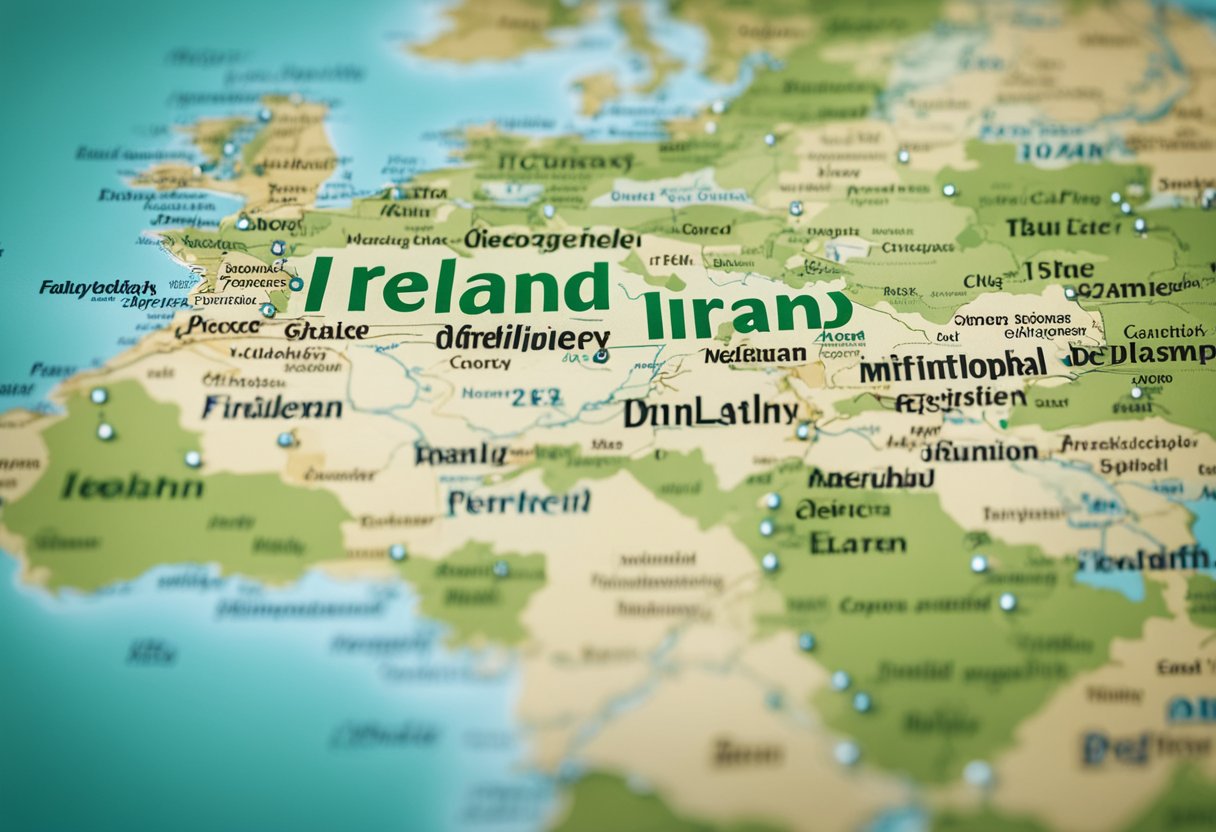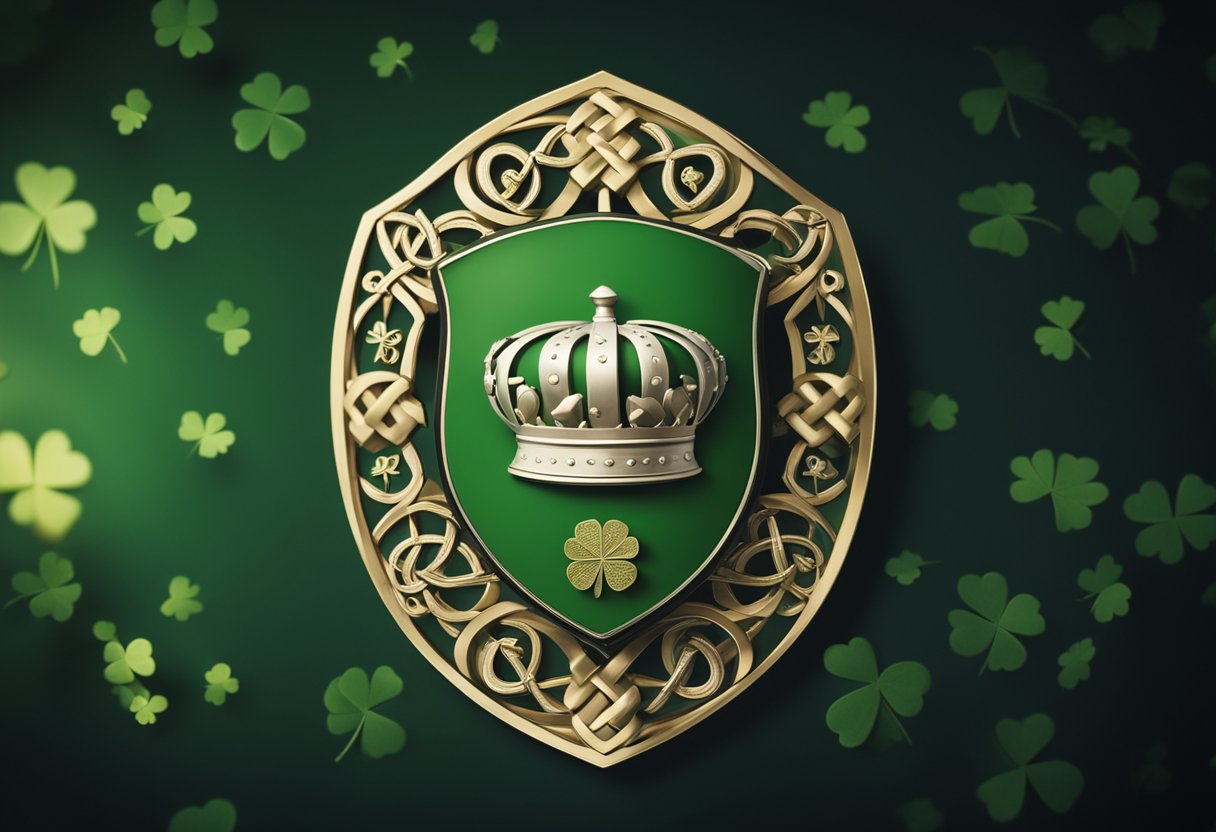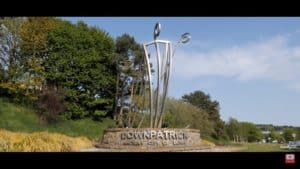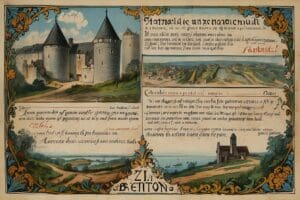The Lore of Irish Surnames: Exploring Their Historical Roots and Significance

Updated On: April 15, 2024 by Maha Yassin
Irish surnames hold a tapestry of historical significance, each thread woven with stories from Ireland’s past. The lore surrounding these family names isn’t merely about identity; it encapsulates centuries of cultural intermingling, invasions, and the socio-political landscape of Ireland. Tracing Irish surnames uncovers a diverse heritage, revealing connections to ancient clans, geographical origins, and occupations. As we explore the roots and meanings of these surnames, we are afforded a glimpse into the lives of our ancestors and how they interacted with the world around them.
Understanding the etymology of Irish surnames provides a linguistic map of Ireland’s history. Prefixes such as ‘O” and ‘Mc’ denote patrilineal descent, while other names hint at trades or physical characteristics. Today’s popular names evolved from Gaelic to Anglicised versions, reflecting the country’s complex history of conquest and resistance. This evolution of surnames mirrors the narrative of Ireland itself, a chronicle of resilience and adaptation. We preserve our history and maintain a vital connection to our Irish origin by preserving these names.
The Origins of Irish Surnames
Irish surnames hold an elaborate tapestry of historical significance and linguistic evolution. They offer a unique glimpse into the past, tracing lineages to Gaelic clans and Norman influences.
Gaelic Roots and Early History
Irish surnames are deeply rooted in Gaelic origins, often constructed from the native language and societal customs of ancient Ireland. Historical linguists inform us that many of these surnames were initially descriptive or patronymic. For example, names such as Ó Conaill, which means “descendant of Conall,” conveyed lineage and ancestry, linking individuals to a notable patriarch and showcasing the value of kinship and heritage.
Medieval historians, such as the famed Irish scholars of monastic scriptoriums, were instrumental in documenting and preserving these surnames’ early structures and meanings. Their works have allowed us to understand the transformation of Gaelic names over centuries.
The Arrival of Norman and Other Surnames
The 12th-century Norman invasion introduced a new wave of surnames into Ireland. These Norman surnames often bore influence from their French roots and bore stark contrasts to native Gaelic names. Interactions between the Gaelic Irish and the Normans led to a blending of cultures and nomenclature. Over time, many of these Norman names became Hibernicised, adopting Gaelic prefixes such as ‘Fitz’, meaning ‘son of’, a translation of the Norman ‘fils’.
This heralded a more complex era of surname evolution, with other nationalities like the Scots, Welsh, Flemish, and even Italian surnames mingling into the tapestry of Irish identity, further expanding our diverse catalogue of surnames. Each name provides historical clues and insights, creating a rich narrative of Ireland’s past.
Geographical Distribution of Surnames in Ireland

In the comprehensive mapping of Irish surnames, certain names are indelibly linked to specific counties and regions. These ties between names and places can reveal historical migrations and settlement patterns across Ireland’s four provinces: Leinster, Munster, Connacht, and Ulster.
County-Specific Surnames
Each of Ireland’s counties harbours a unique set of surnames that often bear the imprint of the local geography. For instance, the surname Joyce is remarkably prevalent in Galway, hinting at the lineage’s strong historical presence in the area. Dublin, as the capital, displays a diverse array of names but certain surnames like Byrne have become particularly synonymous with the region. Cork’s own signature includes surnames such as O’Sullivan, which have deep roots in the county’s history, particularly in the southwestern part. In Ulster, names like O’Neill and Gallagher are entrenched in the locale, serving as a living testament to familial dynasties that once reigned there.
Locative Surnames and Their Significance
Locative surnames in Ireland emerge directly from the geographical features or places with which families were historically associated. These surnames serve as a fascinating key to the past, indicating a person’s heritage and the very landscape from whence their ancestors hailed. For instance, surnames incorporating elements like ‘kil’ (church) or ‘bally’ (townland), such as Kilkenny or Ballymore, indicate an origin near a religious site or a townland of the same name. Such names are not only a nod to the localities but have become integral parts of the cultural fabric of the provinces—Leinster, Munster, Connacht, and Ulster—in which they are most frequently found.
Prefixes and Particles in Irish Surnames
Irish surnames boast a rich tapestry of history and meaning, often signified by prefixes such as ‘Mc’, ‘Mac’, ‘O’’, and ‘Fitz’. These elements indicate family lineage and reflect the complex interplay of Ireland’s linguistic and cultural history.
Meanings and Variations of ‘Mc’ and ‘Mac’
‘Mc’ and ‘Mac’ are prefixed in Irish surnames that translate to ‘son of.’ Both these prefixes have a patronymic origin, depicting ancestral lineage. It’s common to see ‘Mc’ as a contraction of ‘Mac’, derived from the Gaelic word ‘meic’. Regardless of whether a surname uses ‘Mc’ or ‘Mac’, the meaning remains consistent, signifying a familial connection to the name that follows the prefix.
The O’ Prefix and Its History
The prefix ‘O’’, meaning ‘grandson of’ or ‘descendant of’, harks back to an even older tradition of naming. Carrying the Gaelic notion of heritage and bloodline, many surnames beginning with ‘O’’ are widespread in Ireland. The use of this prefix is a quintessentially Irish trait that has persisted through the centuries to symbolise a direct link to the ancestors whose names they bear.
The Fitz Prefix and Norman Influence
The ‘Fitz’ prefix is of Norman origin and was introduced to Ireland during the Norman invasion in the 12th century. The element ‘Fitz’, derived from the French ‘fils’, meaning ‘son’, became intertwined with Irish surnaming customs. Surnames such as ‘Fitzgerald’ and ‘Fitzpatrick’ exemplify the adoption of Norman linguistic patterns, showcasing a fusion of external influences with indigenous traditions.
Occupation and Social Status Reflected in Surnames

In our exploration of Irish surnames, we find that they often tell us about our ancestors’ professions and social standings. These names form a rich tapestry of historical livelihoods and ranks, from the common to the obscure.
Trade-Based Surnames
Many Irish surnames originated in the trades and occupations common during the medieval period. One of the most widespread examples is “Smith,” which denotes one who worked with metal, such as a blacksmith or metalsmith. This type of trade-based surname is indicative of the individual’s occupation and the essential services provided within their communities.
Examples of Trade-Based Surnames:
- Carpenter: Woodworkers and builders.
- Taylor: Derived from the tailor, indicating those who made clothing.
Trades were often passed down from generation to generation, cementing the surname as a legacy of the family’s trade-based identity.
Titles and Status Indicators
Surnames also reflect titles or positions of status within society. These names may have been adopted by or bestowed upon family ancestors as indicators of their social roles or achievements. For instance, a surname like “Knight” could have been used for someone who was an actual knight or worked in a knight’s household.
Some Status and Title-Based Surnames:
- King: Possibly referring to someone who acted regally or served in a king’s household.
- Bishop: This could denote someone who worked for a bishop rather than being one.
Understanding these surnames helps us glimpse the hierarchical structure of historical Irish society and the roles our forebears played within it.
Nicknames and Descriptive Surnames
In the rich tapestry of Irish surnames, nicknames and descriptive terms often paved the way for family names. These identifiers drew from characteristics and physiognomic traits, encapsulating distinctive qualities of an individual.
From Nicknames to Last Names
Nicknames evolved into last names, solidifying a person’s reputation or notable attributes within their lineage. For example, the surname O’Connor derives from the Gaelic Ó Conchobhair, meaning “descendant of Conchobhar,” a personal name signifying ‘lover of hounds’ or ‘wolf-lover’, indicative of someone with a strong affinity for these animals. Another common surname, Kennedy, from Ó Cinnéide, translates to ‘helmeted head’, possibly referring to an ancestor known for wearing a helmet, suggesting a background as a warrior or protector.
Characteristics and Traits
Surnames born from qualitative descriptors or traits paint a vivid picture of our ancestors. For instance, the Irish surname Doherty means ‘hurtful’ or ‘obstructive’, potentially reflecting a formidable family member. In contrast, Flynn, from Ó Floinn, means ‘bright red’, likely referencing an ancestor with a striking, ruddy complexion or conspicuous red hair. The surname Cullen, which stems from ‘cuilein’, might point to a handsome individual or ‘young hound’, inferring youthfulness or vitality.
These designations, woven into the fabric of everyday language, serve as enduring links to the essence of our forebears, preserving their legacies by simply stating our names.
Cultural Influences and Foreign Surnames
Ireland’s surname landscape is a rich tapestry reflecting centuries of migration and conquest, capturing a history of cultural intersection. Our surnames serve as markers of this complex heritage.
Celtic and Anglo-Norman Surnames
Celtic surnames are among Ireland’s oldest and most traditional, often derived from Gaelic clan names. Take “Ó Murchadha,” later Anglicised to Murphy, meaning ‘descendant of sea warriors’. The Norman invasion of Ireland in the 12th century introduced a slew of Norman-derived surnames. For instance, “Fitzgerald” is rooted in the Norman French name “Fitz Gerald,” meaning ‘son of Gerald’.
Later Influences and Immigrant Surnames
With time, Ireland became home to a diverse populace, inviting a variety of surnames outside of native Celtic and Anglo-Norman origins. Post-invasion, surnames with Scottish and English provenance became more common. The arrival of Dutch merchants in the 16th century, Jewish immigrants in the late 19th century, and later communities from Indian and Arabic backgrounds further enriched the surnames in Ireland, each bringing their unique cultural heritage and linguistic elements.
Popular Irish Surnames and Their Meanings
Irish surnames offer a fascinating window into the history and culture of Ireland, each carrying a unique story and meaning. Let’s explore some of the most common and iconic names that bear the island’s heritage.
From O’Brien to Walsh: A Look at the Top Names
Murphy — The surname Murphy, meaning “sea warrior,” is the most prevalent in Ireland. It originates from the Irish “Murchadh” and is renowned throughout counties Cork and Wexford.
Kelly — Next on the frequency list is Kelly, from the old Irish name “O’Ceallaigh.” It means “bright-headed” or “troublesome,” Kelly families are ubiquitous in the Emerald Isle.
Walsh—Walsh, translating to “foreigner” or “Briton,” initially described the Welsh people who came to Ireland during the Anglo-Norman invasions.
O’Connor — With roots implying “descendant of Conchobhar,” this name speaks to the high kings of Connacht and signifies “lover of hounds” or “patron of warriors.”
The Stories Behind Quintessential Irish Names
O’Brien — This significant surname, born from Brian Boru’s prestigious lineage, means “exalted one,” symbolizing its bearers’ noble past.
Common Surnames — Irish surnames often tell tales of ancient professions, characteristic traits, or ancestral locations, each steeped in history and culture.
We invite you to continue this exploration of Irish surnames and their rich cultural significance at Connolly Cove.
Linguistic Analysis of Irish Surnames
As we explore Irish surnames, it’s fascinating to see how sound patterns, spelling variations, and the study of onomastics combine to reveal their historical significance and origin.
Sound Patterns and Spelling Variations
Irish surnames display a richness in sound patterns and spelling variations that reflect the complex history of the Irish language and its interactions with English. These surnames often alternate between Irish and English forms, contributing to the diversity in their spelling. For example, the surname “Ó Raghallaigh,” known in English as “O’Reilly,” demonstrates how the insertion of an apostrophe in English represents the Irish “Ó,” denoting “descendant of.”
The phonetic characteristics of the Irish language, such as the slender and broad vowel sounds, heavily influence the pronunciation and spelling of surnames. These distinctions can result in varying spellings in written records, emphasising the importance of understanding the linguistic principles to trace family heritage accurately.
The Science of Onomastics
Onomastics, the study of names, is central to analysing Irish surnames. Onomastic studies involve lexicographers and scholars who meticulously translate and document the origins and meanings of names. In Ireland, the work on onomastics provides a scientific approach to understanding how surnames have evolved, reflecting family lineage, occupations, and geographic origins.
This branch of linguistics employs scientific methods to unravel the etymology of surnames. By examining historical texts and applying knowledge of ancient and modern Irish, onomastics yields insights into the socio-cultural influences that have shaped Irish surnames over centuries.
Our linguistic database of Irish-language surnames, Gaois, grounds its analysis in this rigorous academic tradition. Through a systematic approach, we preserve the rich tapestry of Gaelic names and illuminate the linguistic heritage that these names carry.
Preservation and Evolution of Irish Surnames
Irish surnames mirror the nation’s past, reflecting its history and societal changes. We explore the journey of these names from ancient times to the modern era.
Historical Preservation Efforts
The task of preserving Irish last names has been ongoing for centuries. Texts dating back to the Middle Ages contain the earliest recordings, providing insights into the origins and meanings of surnames. Historians have carefully traced Irish family names, noting influences from invasions, migrations, and anglicisation. The preservation of this information offers a crucial window into Irish history, showcasing the endurance and adaptability of these surnames.
Contemporary Trends and Changes
Today’s Irish last names are experiencing subtle shifts. Globalisation and increased mobility have introduced new variations and spellings to traditional names. However, a resurgence of interest in genealogical roots is evident, with more individuals seeking to reclaim original Gaelic spellings. Contemporary efforts emphasise documenting these surnames to ensure their continuity, illuminating the evolving tapestry of Irish history and identity.
Surnames and Genealogy Research
Understanding the significance of surnames is crucial in our exploration of Irish heritage. They are not just labels but gateways to our ancestral past.
Tracing Ancestry Through Surnames
Tracing genealogy through surnames resembles assembling a jigsaw puzzle of one’s lineage. Surnames are deeply rooted in family histories and often reflect our forebears’ occupations, locations, or characteristics. For instance, Irish surnames beginning with “Ó” symbolise a lineage (“descendant of”), while “Mac” denotes “son of.” This can be the first clue in linking individuals to a broader family tree. Genealogical studies emphasise the examination of these familial monikers to unravel the stories of our ancestors, with sites like Irish Times Ancestor providing key resources to aid in such inquiries.
Resources and Methods for Genealogical Research
When embarking on genealogical research, various tools and methods are at our disposal. Start by gathering oral histories from family members, then progress to written records like birth certificates, marriage licenses, and census data. Websites specifically dedicated to genealogy can further bolster our search. For example, specialist databases and libraries hold sprawling collections of family names and historical records that shed light on our familial past when pieced together. It is critical to cross-reference information from multiple sources to avoid inaccuracies in our genealogical pursuits.
Frequently Asked Questions
In this section, we answer some of the most commonly asked questions about the fascinating history and meanings behind Irish surnames.
How are the origins of Irish surnames historically categorised?
Irish surnames are historically categorised based on Gaelic clans, Norman influences, and later English and Scottish colonisations. These categories reflect the complex history of invasions and settlements in Ireland.
Which Irish surname is considered the oldest on record?
The surname that holds the distinction of being the oldest on record in Ireland is O’Clery (Ó Cleirigh). This name was first documented in the 10th century, indicating a lineage extending millennia.
What are the factors leading to the Anglicisation of Irish surnames?
The Anglicisation of Irish surnames primarily occurred during the 17th century, enforced by English rule. This process was driven by political, social, and economic pressures, causing traditional Gaelic names to be adapted to the English phonetic and orthographic system.
What is the significance of the prefix ‘O’ in many Irish surnames?
The prefix ‘O’ in Irish surnames, derived from ‘Ó’ meaning ‘grandson’ or ‘descendant’, signifies a patrilineal lineage. This prefix denoted a person’s ancestral lineage, commonly traced to a notable ancestor.
How can one trace the geographic distribution of Irish surnames by county?
The geographic distribution of Irish surnames by county can be tracked through historical records and surname study databases. These resources can provide maps and data illustrating where certain surnames were predominantly in Ireland.
What connection do Irish surnames have with Viking heritage?
Some Irish surnames bear connections to Viking heritage, particularly those emanating from regions of Ireland where Vikings settled, such as Dublin. These names often have Norse origins and reflect the integration of Viking settlers into Irish society.






